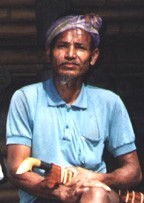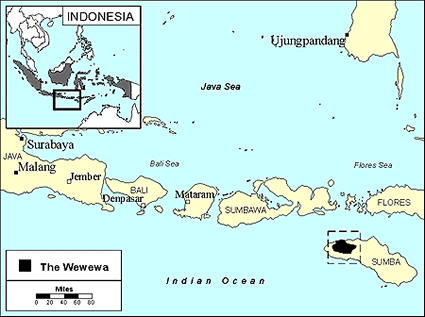The Wewewa live on the western part of Sumba (formerly Sandalwood Island). Sumba, one of the Lesser Sunda Islands, is located in eastern Indonesia, northwest of Australia.
Indonesia is the fourth most populous nation and has one of the most ethnically diverse cultures in the world. The Wewewa are one of several hundred distinct people groups living there. The Indonesian islands act as vital sea routes between Asia, Europe, and Australia. They are also the principal link between the Pacific and Indian Oceans.
The Wewewa are distinguished from the people on the eastern part of the island (the Kambera) primarily by language, although there are some cultural differences as well.
Sumba's mainland consists of plateaus with scattered, irregular hills. Since the climate is hot and dry, most people live on the plateaus, where extensive grasslands support grazing and small-scale agriculture.
Sacred myths that describe the origin of the Wewewa mention ancient places such as "Mecca" and "Djawa." However, documented records of their history only go back as far as the fourteenth century. By the seventeenth century, the island of Sumba was well known for its sandalwood and horses. Even today the Wewewa ride as well as export large herds of wild horses.
Most of the Wewewa are small-scale farmers. They generate income by raising of animals and bartering goods. Seasonal crops include rice and maize, which supplement year-round gardens and tree crops. On very special occasions, the people eat water buffalo.
Sumba has earned a reputation for fine fabrics woven from locally grown cotton. This plays an important role in the economy of the people. Additionally, bartering of labor, services, ceremonial foods and goods supports the economy.
Wewewa elders arrange marriages. In the case of the first marriages of aristocrats, considerable negotiations are commonly made prior to the wedding. Cross-cousin marriages are preferred.
In the past, princes and local rulers governed Indonesia. The nobility consisted of those most closely related to the founding ancestors. Today, however, the people no longer recognize the authority of these individuals rulers.
Traditionally, the Wewewa culture recognized two classes of people: the tau kabihu (humans) and the tauata (slaves). The tauata were either prisoners of war or lawbreakers. Class distinctions persist to the present day based on the status of both parents.
While a significant minority of the Wewewa are practicing Christians, the remainder worship a variety of gods and animistic spirits. (Animism is the belief that non-human objects have spirits.) Their legends tell of the creation of the world, of man's descent from the upper world to the mythical mountaintop, and of the origin of man. These stories also include details about the adventures and travels of their ancestors. Such tales have become, over time, a sacred oral tradition of the Wewewa.
The Wewewa regularly hold religious ceremonies in hopes of maintaining harmony between man and the spirit world. Local priests officiate at all religious ceremonies and funerals of clan members.
Blood sacrifices, food offerings, and prayers facilitate communication with the spirit world. Sacred altars in houses, villages, fields, and even in the bush are a common sight.
The Wewewa people need revival fire in their churches, one that will draw them to obey Christ and take his name to others.
Pray that Christian literature, radio broadcasts, gospel recordings and the JESUS Film will be widely available in their communities.
Pray for the Wewewa people to have the spiritual hunger it takes to put Christ far above any traditional gods or spirits.
Pray there will soon come a day when Wewewa Christ followers will disciple others.
Scripture Prayers for the Wewewa in Indonesia.
https://www.insideindonesia.org/editions/edition-5849/tragedy-in-sumba
| Profile Source: Joshua Project |











